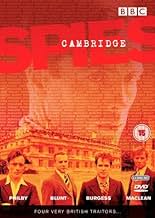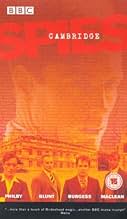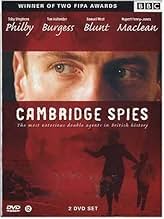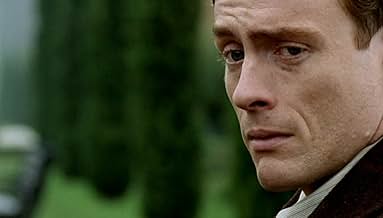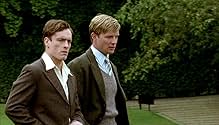Cambridge Spies
- टीवी मिनी सीरीज़
- 2003
- 59 मि
IMDb रेटिंग
7.4/10
2.4 हज़ार
आपकी रेटिंग
अपनी भाषा में प्लॉट जोड़ेंThe true story of a group of Cambridge University Students who are recruited to spy for the Soviet Union in the early 1930s.The true story of a group of Cambridge University Students who are recruited to spy for the Soviet Union in the early 1930s.The true story of a group of Cambridge University Students who are recruited to spy for the Soviet Union in the early 1930s.
- 4 BAFTA अवार्ड के लिए नामांकित
- 3 जीत और कुल 5 नामांकन
एपिसोड ब्राउज़ करें
फ़ीचर्ड समीक्षाएं
A very highly fictionalised account - but why did it need to be? The story of the Cambridge Five really did deserve better than this.
As drama it can't be faulted, but as a depiction of historical events it left much to be desired. We British are prone to look down upon the American TV movie, and for all the same reasons that were evident in the Cambridge Spies.
The story of the Five is well known enough for me not to have to point out the inaccuracies involved in this production, but beyond that I had no real sense of time and place, and certainly no sense of the evil these men did and the horrors and tragedies that came about as a result of their activities. In four hours there was room enough to get it right.
Some events were tick-boxed in glib exchanges, others rendered risible - the horror of Guernica reduced to one aged aeroplane with German markings, a mother, her son, the rattle of gunfire, the inevitable priest who rushes to the aid of the dead boy.
Philby lost his stammer, MacLean's bisexuality was never hinted at, Burgess became almost a paragon of virtue compared with the reality of the man, and Blunt...
The appeal of this series was, whatever the BBC might say, that it was based around real events. In that case I feel the viewer has a right to expect factual accuracy, otherwise the fictionalisation may as well have extended to the substitution of fictional names for the characters, and the excising of the "what happened next" text before the end-credits.
As BBC drama this was well up to standard, as BBC factual drama it took a long step in the wrong direction.
As drama it can't be faulted, but as a depiction of historical events it left much to be desired. We British are prone to look down upon the American TV movie, and for all the same reasons that were evident in the Cambridge Spies.
The story of the Five is well known enough for me not to have to point out the inaccuracies involved in this production, but beyond that I had no real sense of time and place, and certainly no sense of the evil these men did and the horrors and tragedies that came about as a result of their activities. In four hours there was room enough to get it right.
Some events were tick-boxed in glib exchanges, others rendered risible - the horror of Guernica reduced to one aged aeroplane with German markings, a mother, her son, the rattle of gunfire, the inevitable priest who rushes to the aid of the dead boy.
Philby lost his stammer, MacLean's bisexuality was never hinted at, Burgess became almost a paragon of virtue compared with the reality of the man, and Blunt...
The appeal of this series was, whatever the BBC might say, that it was based around real events. In that case I feel the viewer has a right to expect factual accuracy, otherwise the fictionalisation may as well have extended to the substitution of fictional names for the characters, and the excising of the "what happened next" text before the end-credits.
As BBC drama this was well up to standard, as BBC factual drama it took a long step in the wrong direction.
10mattsday
The BBC has once again shown that they can still create top quality drama. While there may be some historical issues with the script, one has to admire the fact that the characters are portrayed accurately and convincingly. Having just seen the last of the four-part series, I can comment that for entertainment value it is top notch.
Sure, some may argue the historical facts are inaccurate, or that the light spun upon the situation is somewhat different to how it was at the time, but much information about the infamous Cambridge spies is uncertain at best - in particular Kim Philby (Toby Stephens) is somewhat a mystery even today. Do not be fooled into thinking that this series is a documentary, it isn't. However, you will be forgiven for thinking that you are watching the actual events, with the locations, pieces and acting all first class.
Watch it with an open mind, as if it is fictional. You will be greatly rewarded, excited and even humoured at how four masterminds underplayed the archaic MI6 for their principals. I'd certainly recommend it.
Overall: 9/10 - Losing the ultimate 1 mark for seeming rushed in parts and sometimes making it hard to understand the relationships between the very complex characters - particularly at the start of the series.
Sure, some may argue the historical facts are inaccurate, or that the light spun upon the situation is somewhat different to how it was at the time, but much information about the infamous Cambridge spies is uncertain at best - in particular Kim Philby (Toby Stephens) is somewhat a mystery even today. Do not be fooled into thinking that this series is a documentary, it isn't. However, you will be forgiven for thinking that you are watching the actual events, with the locations, pieces and acting all first class.
Watch it with an open mind, as if it is fictional. You will be greatly rewarded, excited and even humoured at how four masterminds underplayed the archaic MI6 for their principals. I'd certainly recommend it.
Overall: 9/10 - Losing the ultimate 1 mark for seeming rushed in parts and sometimes making it hard to understand the relationships between the very complex characters - particularly at the start of the series.
What a superb series the BBC has made in Cambridge Spies! The cast are really fantastic. My favourite actor has to be Imelda Staunton as the late Queen Mother. She has some of the best lines and delivers them so well. The leads are cast very well indeed. Tom Hollander is suitably seedy as Guy Burgess, Samuel West is very starchy and upper class as Blunt, Rupert Penry-Jones is wonderful as the handsome but flawed Donald Maclean and Toby Stephens is delightfully dislikable as Kim Philby. These characters are thoroughly entertaining and horrible in the extreme in their betrayal of King and Country. The cloak and dagger feel of the piece is wonderful. The settings are really great too. Cambridge is so beautiful. The writers should be congratulated in keeping the pace moving so well. All in all BBC you have done it again. I wish we saw more quality drama like Cambridge Spies!
This is a lightly fictionalised account of how four tewwibly well brought up English boys betrayed their country to the Soviet Union. Philby's father had been a distinguished diplomat and Arabist and McLean's a cabinet minister. All had public school educations and had been undergraduates at the same Cambridge college. They set off into promising careers in the foreign office and security services and were Soviet agents from the start. Their great coup was to give the Soviets enough details about the atomic bomb to speed up their program to build one by a couple of years, but it was at the expense of blowing McLean and Burgess's cover (they escaped to Moscow in 1951), and Philby being fired from MI6. He joined them in Moscow in 1963. Blunt, by now the Keeper of the Queen's Pictures was then interrogated; he confessed, and was let go.
It's one of the really great spy stories of the 20th century. This version concentrates on the personal dynamics. The amount of contact the spies had with each other after Cambridge seems to be much exaggerated (pretty bad security), but gives us the picture of the gang of four against the Establishment. The women are interesting too. Philby was a ladies' man to whom Donald McLean's American wife Melinda (Anne-Louise Plowman) was attracted. They later lived together in Moscow. Blunt and Burgess were both gay, but friends rather than lovers.
The Establishment, in the person of Lord Halifax (James Fox), Ambassador to Washington, found it difficult to believe that 'people like us' could do such things and started looking for the atomic spy in the embassy kitchens. One or two western counter-intelligence operatives including the CIA's formidable James Jesus Angleton nearly nabbed them, but with Philby tipping them off (and duchessing Angleton), Burgess and McLean made it safely to Moscow.
With four hours to play with all the characters are richly drawn. Tom Hollander's Guy Burgess is a drunken dirty little sod who somehow manages to be witty and charming as well. It was great cover for a spy. As Donald McLean, Rupert Penry-Jones is the Golden Boy who feels himself unworthy, and sees communism as the way to redemption. Toby Stephens as Kim Philby gives us the cleverness, the deviousness and the angst as well, especially in the Spanish episode.(I'm afraid us Philbys are a devious lot, but we bleed, we bleed). Samuel West's Blunt has the occasional hint of emotion, but basically is a cold fish. Art, it seems is his life. He does get on tewwibly well with the Queen.
Seventy years on, it's not so much why they did it, but why they kept it up that mystifies. Given their location close to the heart of British Intelligence and hence knowing as much as anybody outside about what really went on the Soviet Union, it's extraordinary that Philby and McLean in particular continued on right up to 1951 (Blunt was more or less inactive after 1945). It is suggested here that Ms McLean did try to get her husband to give up spying but there's no real explanation as to why he persisted. Perhaps he still believed. Anyway, truth or fiction is hardly the point here - Sunday night is not for history lessons. This is a familiar tale well told, visually splendid and not too taxing. The real story, I suspect, is far too complex for even the most adroit (or left) TV producer. An earlier TV account,"Philby Burgess and McLean" (1977) is also worth watching, if you can find it.
It's one of the really great spy stories of the 20th century. This version concentrates on the personal dynamics. The amount of contact the spies had with each other after Cambridge seems to be much exaggerated (pretty bad security), but gives us the picture of the gang of four against the Establishment. The women are interesting too. Philby was a ladies' man to whom Donald McLean's American wife Melinda (Anne-Louise Plowman) was attracted. They later lived together in Moscow. Blunt and Burgess were both gay, but friends rather than lovers.
The Establishment, in the person of Lord Halifax (James Fox), Ambassador to Washington, found it difficult to believe that 'people like us' could do such things and started looking for the atomic spy in the embassy kitchens. One or two western counter-intelligence operatives including the CIA's formidable James Jesus Angleton nearly nabbed them, but with Philby tipping them off (and duchessing Angleton), Burgess and McLean made it safely to Moscow.
With four hours to play with all the characters are richly drawn. Tom Hollander's Guy Burgess is a drunken dirty little sod who somehow manages to be witty and charming as well. It was great cover for a spy. As Donald McLean, Rupert Penry-Jones is the Golden Boy who feels himself unworthy, and sees communism as the way to redemption. Toby Stephens as Kim Philby gives us the cleverness, the deviousness and the angst as well, especially in the Spanish episode.(I'm afraid us Philbys are a devious lot, but we bleed, we bleed). Samuel West's Blunt has the occasional hint of emotion, but basically is a cold fish. Art, it seems is his life. He does get on tewwibly well with the Queen.
Seventy years on, it's not so much why they did it, but why they kept it up that mystifies. Given their location close to the heart of British Intelligence and hence knowing as much as anybody outside about what really went on the Soviet Union, it's extraordinary that Philby and McLean in particular continued on right up to 1951 (Blunt was more or less inactive after 1945). It is suggested here that Ms McLean did try to get her husband to give up spying but there's no real explanation as to why he persisted. Perhaps he still believed. Anyway, truth or fiction is hardly the point here - Sunday night is not for history lessons. This is a familiar tale well told, visually splendid and not too taxing. The real story, I suspect, is far too complex for even the most adroit (or left) TV producer. An earlier TV account,"Philby Burgess and McLean" (1977) is also worth watching, if you can find it.
I had heard and read about Kim Philby, of course, but not of the other ones, plus I was not aware of their past and story of formation. Realistic atmosphere, motives well explained and logical, vices and virtues of the protagonists, etc. - everything depicted in a skilful manner. And, of course, the performances, particularly Tom Hollander as Guy Burgess, but also the others - convincing, stylish, but also showing dangers of "elite" and closed communities where depravities are so easy to emerge and develop.
In retrospect, one may ponder on and over how the British authorities were so naive, but, on the other hand, it was an era without much technology and funding to deal with "the own"...
In retrospect, one may ponder on and over how the British authorities were so naive, but, on the other hand, it was an era without much technology and funding to deal with "the own"...
क्या आपको पता है
- ट्रिवियाBased on the same real life events as Another Country (1984), History in Faces: Cambridge Five (2011), Philby, Burgess and Maclean (1977), A Question of Attribution (1991), An Englishman Abroad (1983), Tinker Tailor Soldier Spy (2011), Tinker Tailor Soldier Spy (1979), Blunt (1987), Traitor (1971), Blade on the Feather (1980), The Jigsaw Man (1983) and influenced the source novels of The Fourth Protocol (1987), The Innocent (1993) and others works such as A Different Loyalty (2004) and Olding (2019), even in minor form like in The Imitation Game (2014).
- गूफ़Guy Burgess is in a London flat eating Van Camps baked beans from a can. This brand is not available in England.
- भाव
Guy Burgess: Vladivostok, Moscow, the Kusnetsk Basin, Cambridge - the coldest places on Earth. Of the four, Cambridge is the coldest, permanently February the nineteenth.
- कनेक्शनVersion of Philby, Burgess and Maclean (1977)
- साउंडट्रैकJerusalem
by Hubert Parry
टॉप पसंद
रेटिंग देने के लिए साइन-इन करें और वैयक्तिकृत सुझावों के लिए वॉचलिस्ट करें
- How many seasons does Cambridge Spies have?Alexa द्वारा संचालित
- How damaging were the ring's activities?
- What happened to each?
- Who was John Caincross and was he part of the ring?
विवरण
- रिलीज़ की तारीख़
- कंट्री ऑफ़ ओरिजिन
- आधिकारिक साइट
- भाषा
- इस रूप में भी जाना जाता है
- Espías de Cambridge
- फ़िल्माने की जगहें
- उत्पादन कंपनियां
- IMDbPro पर और कंपनी क्रेडिट देखें
इस पेज में योगदान दें
किसी बदलाव का सुझाव दें या अनुपलब्ध कॉन्टेंट जोड़ें


